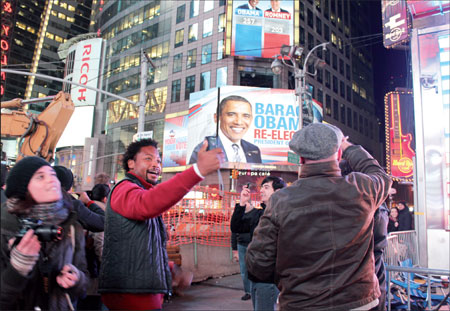Obama wins another term
|
People celebrate the victory of US President Barack Obama at the Times Square in New York on Tuesday. Yu Wei / China Daily |
US President faces complex task over Asia-Pacific policy
A re-elected President Barack Obama will need to spend some of his political capital on stabilizing the United States' relationship with China even as those ties continue to get more competitive.
Obama won re-election on Tuesday night despite a fierce challenge from Republican Mitt Romney, prevailing in the face of a weak economy and high unemployment that encumbered his first term and crimped the middle class dreams of millions, the Associated Press reported.
Some leading American experts on China say Obama's challenges over the next four years are likely to include fleshing out the US policy, including militarily, of "rebalancing" toward an expanded Asia-Pacific presence; building a second-term foreign-policy team; and formulating durable trade policies with China.
Many China specialists in the US have approved of Obama's China policy so far. Highlights include regular exchanges with the Asian country in the key areas of trade, defense, culture, education and tourism.
Obama is widely expected to continue his policies on China, particularly in building comprehensive, cooperative bilateral ties.
Michele Flournoy, senior foreign-policy adviser to the Obama re-election campaign and a former undersecretary of defense for policy, said at the Democratic National Convention in September that she didn't foresee any second-term changes by Obama toward China.
But Obama will confront a more complicated agenda with China, marked by intensified mutual suspicions over geopolitical positioning, said Jonathan Pollack, an expert on Asia-Pacific security at the Brookings Institution and acting director of its John L. Thornton China Center.
If this suspicion isn't addressed, "it could lock both countries into an antagonist relationship neither country wants," he said.
Since the administration launched its rebalancing, or "Asia pivot", strategy this summer, many in China have seen the move as aimed at containing China's development in the region. However, Beijing has expressed hope that Washington would play a positive role by contributing to Asia-Pacific stability and prosperity.
Pollack urged the new leadership in each country to make "major and early efforts" to ensure a stable foundation for the relationship in all crucial areas. Without this, "we will face some real turbulence in the relationship," he warned.
Another challenge for Obama, he said, is to find suitable replacements for his departing foreign-policy team, led by Secretary of State Hillary Clinton and Kurt Campbell, assistant secretary for East Asian and Pacific affairs. The two have been the driving force behind America's Asia-rebalancing strategy.
There has been much speculation that Senator John Kerry will succeed Clinton as secretary of state once Obama's second term begins early next year.
Kerry formerly served as the ranking Democrat on the Foreign Relations subcommittee on East Asian and Pacific affairs and is regarded as an expert on the region.
Also considered to be on the short list of secretary of state candidates are US Ambassador to the United Nations Susan Rice and Obama's national security adviser, Tom Donilon.
Douglas Paal, director of the Asia program at the Carnegie Endowment for International Peace, said Obama should change his Asia policy.
"My hope is the administration can return to promoting trade, seeking more targeted results on trade and investment issues, and not play up the military aspects of the rebalancing, which will continue," he said.
In November 2011, Obama announced that 2,500 Marines would be stationed in Australia. His visit to Darwin, capital of that country's Northern Territory, which faces the South China and East China seas, was seen as a signal of US strategic intentions.

























